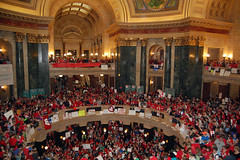 Where do Christians stand with regard to Wisconsin’s euphemistically named “budget repair bill“? That’s a question stirring up some debate around the blogosphere.
Where do Christians stand with regard to Wisconsin’s euphemistically named “budget repair bill“? That’s a question stirring up some debate around the blogosphere.
Becky Garrison at Comment is free:
While the US Catholic church traditionally sides with Republican interests in promoting a pro-life agenda, the archdiocese of Milwaukee threw its support behind the unions in the ongoing Wisconsin-based protests against the erosion of workers’ bargaining rights.
Reflecting on the significance of the Catholic church backing a cause that’s historically been a linchpin of the Democrat party platform, Daniel Schultz, author and pastor of a United Church of Christ congregation in rural Wisconsin, said: “This shift means that Wisconsin Catholics are not going to retreat into social conservatism and let the Republican governor enact legislation that is not in sync with the will of the people.”
Writing at Religion in American History, Heath Carter finds this assessment far too optimistic:
[By] breezily downplaying the Tea Party’s reach Garrison seems to forget that, just three months ago, the state of Wisconsin elected Scott Walker to be its governor.To have a fuller sense of the relationship between religion and labor in present-day Wisconsin one would need to pay close attention to the rhetoric that everyday people are using on both sides of the debate—who is marshaling religious language and arguments to support their view, and to what effect? (It would be interesting, for example, to study the language on signs that demonstrators on both sides are carrying). In addition, one would need to know more about what happens this weekend, in synagogues and churches around the state: will rabbis, priests, and ministers broach the labor dispute, and if so, what notes will they strike? Most interesting to me—and most difficult to recover—are the conversations that will happen over meals following those religious services: in the restaurants and kitchens where ordinary people will debate the meaning of religion for economic life. It is in those places and amongst those people that lasting change begins.
This more pessimistic assessment is supported by Julie Ingersoll at Religion Dispatches, who finds that the religious right gives some measure of biblical sanction the the union-busting tactics employed by Wisconsin governor Scott Walker.
But Kim Bobo, also at Religion Dispatches, notes:
The proposals are so draconian and such clear violations of religious teachings in support of workers’ rights to organize and engage in collective bargaining that Wisconsin religious leaders across faith traditions have issued public statements, sent letters to the Governor and legislators, and are participating in rallies and public events.
See also Diana Butler Bass on Walker’s religiosity, and Nicole Neroulias with a historical perspective on religious involvement in labor struggles.












